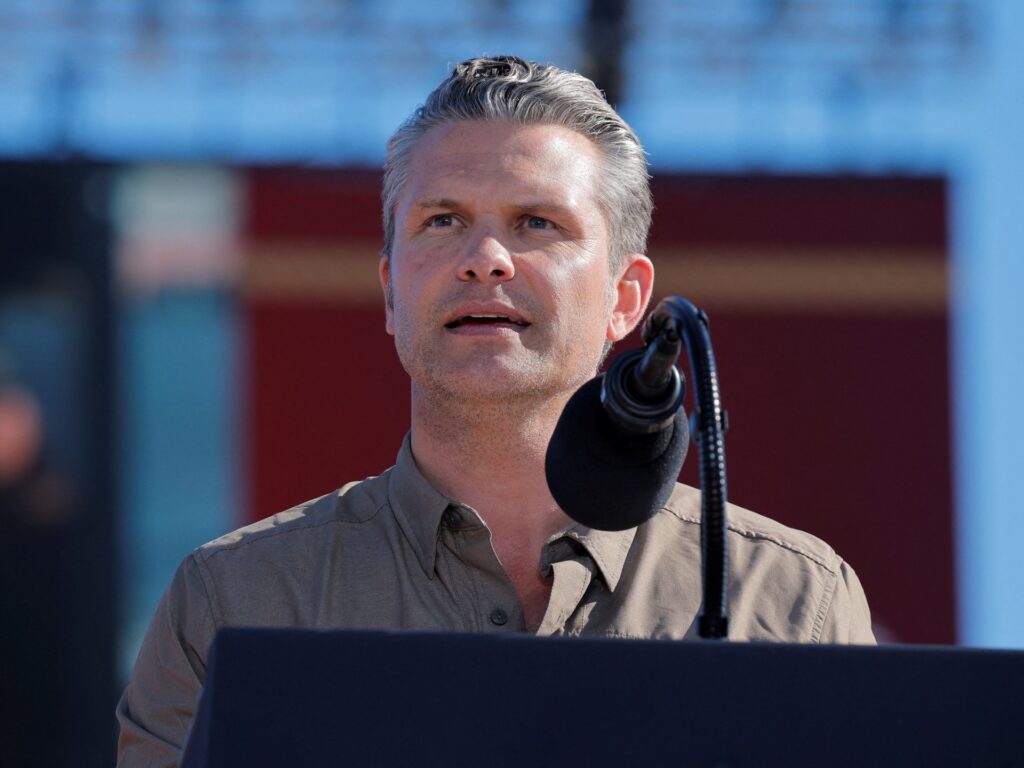The United States has announced its 10th missile strike on a maritime vessel accused of trafficking illegal narcotics, killing all six people on board.
Friday’s attack brings the total known number of dead since the bombing campaign began to 43.
Recommended Stories
list of 3 itemsend of list
It also marks an escalating pace to the air strikes: The US government has announced three strikes this week in as many days.
Defense Secretary Pete Hegseth broke the news of the latest bombing on his social media, identifying the victims as members of the Venezuela-based gang Tren de Aragua.
He also indicated that President Donald Trump himself had once again given authorisation for the strike, which allegedly took place in international waters in the Caribbean Sea.
“The vessel was known by our intelligence to be involved in illicit narcotics smuggling, was transiting along a known narco-trafficking route, and carrying narcotics,” Hegseth wrote, though he provided no evidence to justify his allegations.
Hegseth added that this was the military’s first strike on a boat at night.
He then repeated what has been an emerging argument in the Trump administration: that drug traffickers should be treated no differently than armed groups like al-Qaeda.
“If you are a narco-terrorist smuggling drugs in our hemisphere, we will treat you like we treat al-Qaeda,” Hegseth said. “Day or NIGHT, we will map your networks, track your people, hunt you down, and kill you.”

Legal questions mount
While this year the Trump administration has started labelling Latin American cartels as “foreign terrorist organisations”, the label has traditionally been used to describe armed groups that seek to use violence for political or ideological aims.
Legal experts also maintain that a terrorism label alone does not justify the use of military force.
Already, leaders in Colombia and Venezuela have denounced the bombing campaign as “murder”, and human rights experts at the United Nations have condemned the killings as a potential violation of international law.
Treaties like the UN Charter largely limit the use of military force except in cases of self-defence.
“International law does not permit the unilateral use of force abroad to fight terrorism or drug trafficking,” UN human rights specialists, including Ben Saul, wrote in response to the strikes.
The bombing campaign began on September 2, with a missile strike that killed 11 people. Two more attacks were conducted that month.
October, however, has brought an increase in the frequency of the strikes and a broadening of their scope.
At least seven known strikes have taken place this month, and while most have been concentrated in the Caribbean, two last week were conducted in the Pacific Ocean for the first time.
An attack on October 16 — targeting a submersible — also left two survivors, another first.
Those survivors have since been repatriated to their home countries, Ecuador and Colombia. In Ecuador, the government released the man shortly after his arrival, saying there was no evidence to charge him with a crime.
Critics have compared the bombing campaign to extrajudicial killings. Families in Colombia and Trinidad and Tobago, an island nation off the shore of Venezuela, have claimed some of the victims as their loved ones.
The men were fishermen, not narcotics traffickers, the families have said.

Trump claims authority
Still, the Trump administration has indicated it has no plans to slow its bombing campaign against those it characterises as drug traffickers.
The US president has also repeatedly threatened to expand his bombing campaign to overland targets as well, a pledge that has yet to come to fruition.
On Thursday, at a White House roundtable highlighting his crackdown on illicit drugs, Trump was questioned why he has not approached Congress for military authorisation as the bombing campaign quickens.
“ If you are declaring war against these cartels and Congress is likely to approve of that process, why not just ask for a declaration of war?” one reporter asked the president.
Under the Constitution, Congress has the exclusive power to authorise military action, though it has, in the past, issued “authorisations for the use of military force” or AUMFs for the president to conduct specific attacks.
Critics say those authorisations have been increasingly used to justify unilateral decisions by US presidents to launch military campaigns.
Faced with the reporter’s question about congressional approval, Trump was unequivocal: He needed no such approval.
“ I don’t think we’re going to necessarily ask for a declaration of war. I think we’re just gonna kill people that are bringing drugs into our country. OK? We’re going to kill them. They’re going to be, like, dead,” Trump replied at Thursday’s roundtable.
A day earlier, at a news conference with NATO Secretary-General Mark Rutte, Trump had also argued that the death toll from drug overdoses validated his decision to conduct the deadly bombing campaign.
“This is a national security problem,” he said, claiming the drug trade had killed 300,000 US citizens over the past year. “And that gives you legal authority.”
Those statistics are not supported by US government data, however. Provisional data from the Centers for Disease Control and Prevention found that there have been 73,690 overdose deaths in the US for the 12-month period ending in April.
If, as Trump has claimed, every bombed boat saves 25,000 US lives, that number would be 250,000 instead.

